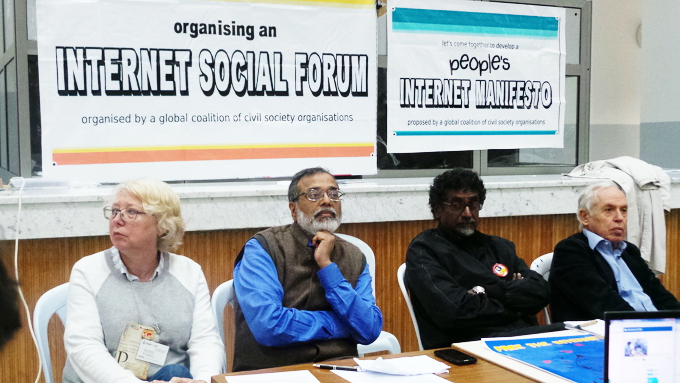
An agenda for the people’s Internet
by Sally Burch — ALAI
Since the Internet is now almost ubiquitous and it is we who bring it to life and give it content, does it make sense for us to remain simply as users of services that the big corporations of the sector offer us, under their own conditions? Or should we be taking part in how it is developed and have some power of decision over how our contributions are used? Finding the answers to these questions will be one of the great challenges of this century.
It is worth recalling that when the web was born, about a quarter of a century ago (1993), and the use of the Internet began to expand, many popular and citizens groups welcomed it as a chance to democratize communication, share information, ideas and knowledge and to weave horizontal networks. It coincided with the period of growth of struggles of social movements against neoliberalism, especially in the global South. Internet became an indispensable tool for linking popular and citizens’ struggles across the planet, generating people’s media, interconnecting academic research, facilitating community development initiatives and much more. The people’s Internet[1] took shape and multiplied through countless initiatives in connectivity, software, programs, platforms, content, websites, etc. One might say that Internet became the friendly face of globalization.
From the end of the twentieth century, there was a rapid increase in private investment in the sector; digital social networks appeared and access became massive. In parallel, large private platforms came to predominate, where today the majority of Internet interactions are concentrated, under the control of a handful of mega-corporations. The people’s Internet, based on the commons, is still alive, but increasingly pushed to the margins by the corporate offensive.
Now we are rapidly entering a new phase: the era of the Internet of things, of the digital economy and artificial intelligence. Mass data collection provides the main input and source of value of this economy: data are sold to advertisers, processed through algorithms that control ever more areas of our lives and fed into artificial intelligence systems. They are prey for surveillance programmes, spying and cyberwars. Those who gather and control data concentrate power and wealth. The big Internet corporations and security services take advantage of regulatory vacuums (both national and international) in order to impose their rules. Citizens are powerless to defend their rights or develop autonomous projects.
It was through awareness of this situation that the initiative behind the Internet Social Forum (ISF) took shape, as an autonomous world space of social and citizens’ organizations from diverse social sectors, to debate and seek answers to this situation. It was agreed to do so under the umbrella of the process of the World Social Forum, with its affirmation that “another world is possible” in the face of the neoliberal proposition that “there are no alternatives.”
In support of this initiative, in 2017 various Latin American organizations [1] set up a process of interchange to stimulate the formulation of proposals and initiatives from a regional perspective. With a combination of virtual and face-to-face exchanges and dissemination on these issues, this process led up to the Meeting “Dialogues for a People’s Internet: Our America towards to the Internet Social Forum” (Quito, September 27-29, 2017).
The Meeting prioritized three areas of debate: 1) knowledge; 2) WTO/ e-commerce, work and territory; 3) democracy, security and the State. The dynamic began by situating the global and regional context in these three areas, and then focused on interchange on the issues in view of establishing a regional agenda. Moreover, various experiences of the people’s Internet were shared.
Priorities: Rights and data protection
In the discussion groups, proposals were formulated [2] for the region as well as for the global Internet Social Forum (programmed to take place in India in 2018), both in the field of public policy, as well as for citizens’ action and initiatives. From there, some common lines of action and transversal themes emerged, in particular: human rights and data protection.
Consequently, several priority actions were identified for the coming months, including:
– To establish a broad communications campaign to raise awareness among social organizations, the general public and public authorities on the present tendencies in the Internet and digital technologies, since many of these issues are new and their implications are still not evident for the majority of the population, or even, in many cases, for those responsible for public policies. Among the priority issues are: data management and its impacts on democracy; artificial intelligence and algorithms and the urgency of establishing norms; security and privacy and how to differentiate the tools to be employed, whether for disseminating public information or for undertaking private interchanges (secure messaging channels); implications of the proposal to negotiate e-commerce in the WTO; the danger of cyberweapons; electronic government and its role in promoting citizens’ participation…
– As an urgent priority, to develop public debate in each country and develop criteria for legislation on questions relating to the protection and handling of data and against digital violence. As a contribution to this debate, it was agreed to share experiences and proposals among different countries, taking into account, among other criteria:
- Guarantees for the security and privacy of persons, as a priority.
- Creation of data protection agencies that guarantee the protection of citizens. Data should be decentralized and not concentrated in the hands of the State.
- Guarantees for transparency in the handling and use of personal data in the public and private sectors.
- Personal data or those that allow the identification of a person should be declared non-tradable. Precedence to the protection of personal data over consumption and services.
- Limits and norms for the use of biometric registers.
- Establishing that public data cannot be stored on foreign servers
In that respect, the need was also seen for public debate to re-signify the nature of data: in particular that they should not be considered as commercial goods, but rather as a social good useful for public policies. This also implies defining which data should be public or open and which should be private. The data that States produce should normally be considered public; those that are tied to individuals are those that need protection.
– To share and systematize inputs and experiences that feed into citizens’ action, such as a guide of free and open source software programmes and security tools for different needs; a compilation of good practices for the people’s Internet; inputs on legislation and public policies in different areas; training materials.
In addition, for the agenda of the coming months, it was agreed:
– To take part in the campaign to raise awareness and the mobilizations to reject the negotiation of e-commerce in the World Trade Organization –WTO– (as well as in free trade agreements) since this is an offensive from the big digital transnationals and their governments to deregulate the whole sector in their favour and guarantee that they can exploit data without any restrictions.
– To promote proposals on digital rights for the Binding Treaty on Transnational Corporations and Human Rights, whose first session of negotiation was programmed for October 2017 in the UN Human Rights Council.
– To support the world campaign against killer robots and cyberweapons.
– To channel proposals towards regional integration bodies, in matters of technical sovereignty and digital rights.
– In preparation for the global Internet Social Forum, to further develop the debates on these themes in international spaces such as: the parallel events to the Ministerial Meeting of the WTO (Buenos Aires, December 9-14, 2017); the World Social Forum (Salvador de Bahia, Brazil, March 2018).
It was also proposed to establish the bases for a universal declaration on the access, use and development of the Internet, as a regional contribution to bring to the global Internet Social Forum.
Public policies
The discussion groups also formulated various proposals referring to public policies. Among these, there is the need to consider the Internet as a public good or essential service, with universal access, rather than a market service; and that Internet service provision be considered a public service.
Regarding security and surveillance, there is an emphasis on a conception of human security (as opposed to considering only the security of the infrastructure or the owners). This implies typifying the violation of privacy and digital violence, differentiating the juridical goods violated and the type of actors: state, company, person. There is also a call for transparency in the use of public budgets in security agencies and the evaluation of their effectiveness (e.g. surveillance cameras).
In addition, it is necessary to create a legal framework to regulate the application of artificial intelligence and to guarantee the transparency of algorithms.
With respect to technological sovereignty, emphasis was placed on peoples’ sovereignty, under a premise of the public interest. There is agreement to promote the obligation of using free software in systems of public interest, in particular in the educational system, with incentives for the local development of software. And laws should be promoted to guarantee network neutrality: that is to say, equal treatment of all sources, without favouring certain companies or control policies. It is also proposed to undertake action to remove intellectual property management from the penal area and place it under civil law.
Similarly, it is important to promote South-South cooperation, for example for intraregional connectivity infrastructure (fiber-optic ring, satellites); public and citizens’ collaborative laboratories for the creation of artificial intelligence; manufacturing of telecommunications components; the development of regional Internet platforms responding to regional interests and to reduce dependency on the large transnational platforms, among others.
The educational curriculum among other aspects should contemplate Science, Technology and Society in a transversal manner; promote critical education; promote understanding of the Internet as artefact and culture; promote the conscious use of technologies and its impacts on society and the importance of privacy and encryption.
Regarding questions of labour and the popular economy, policies are required to guarantee the rights of workers in the face of the tendency towards more precarious work resulting from automation and the mode of operation of the new digital enterprises (for example, transport companies that do not recognize their drivers as employees). And policies for promotion of e-commerce that favour the SMEs and national rural producers, instead of creating dependency on transnationals.
Towards a people’s Internet
The people’s Internet is being built through a multitude of actions developed by distinct sectors. It is important to strengthen the ties among them. Some of the ideas mentioned include:
– That citizens take back control of the digital world, by producing their own contents that respond to their identities, interests, concerns and diversity. (For example, to diversify the contents in Wikipedia). And that includes employing our power to use or abandon abusive social networks or companies.
– To generate teaching material and distribute it; to form brigades for training and raising awareness; to engage in training activities with respect to free technology and culture.
– To propose interchanges, information, analysis on the impact of technological changes in labour (precarious work), farming, the environment, cities, etc. To call attention to negative proposals in areas such as geoengineering, the green economy, genomes, that are likely to be further empowered by digital technologies.
– To seek convergence between the technology sectors, techno-politics, popular movements, citizens’ organizations and public sector entities, in order to construct an organized social force to promote this agenda.
~ ~ ~
These announcements are interactive. Click on them for more information.










